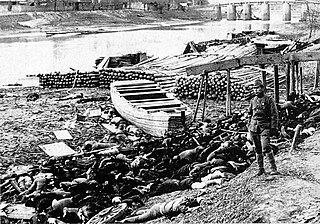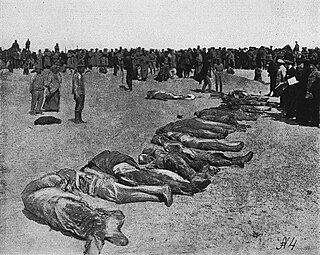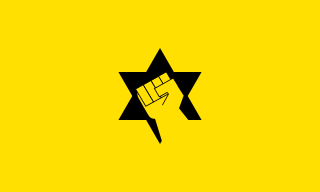Related Research Articles

State terrorism refers to acts of terrorism which a state conducts against another state or against its own citizens.

Terrorism, in its broadest sense, is the use of violence against non-combatants to achieve political or ideological aims. The term is used in this regard primarily to refer to intentional violence during peacetime or in the context of war against non-combatants. There are various different definitions of terrorism, with no universal agreement about it. Different definitions of terrorism emphasize its randomness, its aim to instill fear, and its broader impact beyond its immediate victims.

Counterterrorism, also known as anti-terrorism, relates to the practices, military tactics, techniques, and strategies that governments, law enforcement, businesses, and intelligence agencies use to combat or eliminate terrorism.
Religious terrorism is a type of religious violence where terrorism is used as a strategy to achieve certain religious goals or which are influenced by religious beliefs and/or identity.
There is no consensus, scholarly or legal, on the definition of terrorism.
Christian terrorism, a form of religious terrorism, refers to terrorist acts which are committed by groups or individuals who profess Christian motivations or goals. Christian terrorists justify their violent tactics through their interpretation of the Bible and Christianity, in accordance with their own objectives and worldview.
George Joseph Michael is an American historian, political scientist, and writer. He is a professor at the criminal justice faculty of Westfield State University in Massachusetts, and previously served as associate professor of nuclear counterproliferation and deterrence theory at the Air War College and as associate professor of political science and administration of justice at The University of Virginia's College at Wise. He studies right-wing extremism, including the relationship between militant Islam and the far right, and is the author of Confronting Right-Wing Extremism and Terrorism in the USA (2003), The Enemy of My Enemy: The Alarming Convergence of Militant Islam and the Extreme Right (2006), Willis Carto and the American Far Right (2008), Theology of Hate: A History of the World Church of the Creator (2009), Lone Wolf Terror and the Rise of Leaderless Resistance (2012), and Extremism in America (editor) (2014). Professor Michael has also published research on SETI and is the author of Preparing for Contact: When Humans and Extraterrestrials Finally Meet (2014).
Mia M. Bloom is a Canadian academic, author, and Professor of Communication at Georgia State University. She was formerly an associate Professor of International Studies at the Pennsylvania State University in University Park and a fellow at the International Center for the Study of Terrorism at Penn State.
S. N. Balagangadhara is a professor emeritus of the Ghent University in Belgium, and was director of the India Platform and the Research Centre Vergelijkende Cutuurwetenschap.
Critical terrorism studies (CTS) applies a critical theory approach rooted in counter-hegemonic and politically progressive critical theory to the study of terrorism. With links to the Frankfurt School of critical theory and the Aberystwyth School of critical security studies, CTS seeks to understand terrorism as a social construction, or a label, that is applied to certain violent acts through a range of political, legal and academic processes. It also seeks to understand and critique dominant forms of counter-terrorism.

Robert Garner is a British political scientist, political theorist, and intellectual historian. He is a Professor Emeritus in the politics department at the University of Leicester, where he has worked for much of his career. Before working at Leicester, he worked at the University of Exeter and the University of Buckingham, and studied at the University of Manchester and the University of Salford.
Anthony Burke is an Australian political theorist and international relations scholar. He is Professor of Environmental Politics and International Relations at the University of New South Wales. He is co-principal with Stefanie Fishel at the Planet Politics Institute.

Terror is a policy of political repression and violence intended to subdue political opposition. The term first appears in the Reign of Terror, a revolutionary violence during the French Revolution, which also gave rise to the term terrorism.

Political violence is violence which is perpetrated in order to achieve political goals. It can include violence which is used by a state against other states (war), violence which is used by a state against civilians and non-state actors, and violence which is used by violent non-state actors against states and civilians. It can also describe politically motivated violence which is used by violent non-state actors against a state or it can describe violence which is used against other non-state actors and/or civilians. Non-action on the part of a government can also be characterized as a form of political violence, such as refusing to alleviate famine or otherwise denying resources to politically identifiable groups within their territory.

Kahanism is a religious Zionist ideology based on the views of Rabbi Meir Kahane, founder of the Jewish Defense League and the Kach party in Israel.

Alasdair Cochrane is a British political theorist and ethicist who is currently Professor of Political Theory in the Department of Politics and International Relations at the University of Sheffield. He is known for his work on animal rights from the perspective of political theory, which is the subject of his two books: An Introduction to Animals and Political Theory and Animal Rights Without Liberation. His third book, Sentientist Politics, was published by Oxford University Press in 2018. He is a founding member of the Centre for Animals and Social Justice, a UK-based think tank focused on furthering the social and political status of nonhuman animals. He joined the Department at Sheffield in 2012, having previously been a faculty member at the Centre for the Study of Human Rights, London School of Economics. Cochrane is a Sentientist. Sentientism is a naturalistic worldview that grants moral consideration to all sentient beings.
Raia Prokhovnik, is Reader in Politics at the Open University's Faculty of Social Sciences, for their Department of Politics and International Studies, and founding editor of the journal Contemporary Political Theory. She is the chair of the OU's interdisciplinary politics module, Living political ideas, and contributed to other modules including Power, dissent, equality: understanding contemporary politics.
John Hadley is an Australian philosopher whose research concerns moral and political philosophy, including animal ethics, environmental ethics, and metaethics. He is currently a senior lecturer in philosophy in the School of Humanities and Communication Arts at Western Sydney University. He has previously taught at Charles Sturt University and the University of Sydney, where he studied as an undergraduate and doctoral candidate. In addition to a variety of articles in peer-reviewed journals and edited collections, he is the author of the 2015 monograph Animal Property Rights and the 2019 monograph Animal Neopragmatism. He is also the co-editor, with Elisa Aaltola, of the 2015 collection Animal Ethics and Philosophy.
Dov Waxman is an author, academic and commentator. He is the Rosalinde and Arthur Gilbert Foundation Professor of Israel Studies at the University of California, Los Angeles (UCLA), and the director of the UCLA Younes and Soraya Nazarian Center for Israel Studies.
Margaret Moore is a Canadian political theorist, academic and scholar. She is a Professor of Political Studies and Philosophy at Queen's University at Kingston.
References
- ↑ Avery Plaw (2008). Targeting terrorists: a license to kill?. Ashgate Publishing, Ltd. ISBN 9780754645269 . Retrieved October 21, 2010.
- ↑ Daniel A. Bell, Avner De-Shalit (2003). Forms of justice: critical perspectives on David Miller's political philosophy. Rowman & Littlefield. ISBN 9780742521797 . Retrieved October 21, 2010.
- ↑ Mark Bevir (2010). Encyclopedia of Political Theory. SAGE. ISBN 9781412958653 . Retrieved October 21, 2010.
- ↑ Meisels, Tamar (September 2006). "The Trouble with Terror: The Apologetics of Terrorism–a Refutation". Terrorism and Political Violence. 18 (3): 465–483. doi:10.1080/09546550600752030. S2CID 143391009.
- ↑ Bushinsky, Jay (April 16, 1997). "Andrew Meisels dies at 64". The Jerusalem Post. Archived from the original on November 4, 2012. Retrieved October 21, 2010.
- ↑ "'Post' columnist Martha Meisels dies at 57". The Jerusalem Post. July 26, 1995. Archived from the original on July 14, 2012. Retrieved October 21, 2010.
- ↑ "Israeli correspondent Andrew Meisels, 64, dies". nl.newsbank.com. The Washington Times. April 16, 1997. Archived from the original on 2012-10-23. Retrieved 16 April 2023.
- ↑ Hubert J. Cloke (June 30, 2010). "Faculty". Bulletin.georgetown.edu. Archived from the original on June 11, 2010. Retrieved October 21, 2010.
- ↑ "Do Israeli jails prepare prisoners for peace?", Josh Spiro, Jewish Post
- ↑ "The Trouble with Terror: The Apologetics of Terrorism—a Refutation", Tamar Meisels, Terrorism and Political Violence, Volume 18, Issue 3, September 2006, pp. 465–83
- ↑ "Targeted Killing" Archived 2011-07-25 at the Wayback Machine , Alia Brahimi, Oxford Leverhulme Programme on the Changing Character of War, February 10, 2009